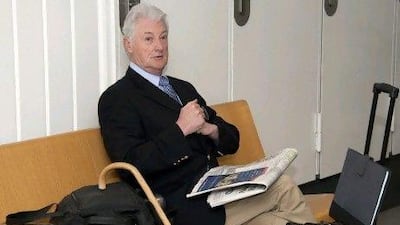LONDON // The British government is to conduct a "proper, sober and thoughtful" review of the nation's extradition arrangements with the United States after a retired London businessman was sent for trial in America on charges of supplying batteries for Iranian missiles.
The promise of a review was made by the prime minister, David Cameron, this week amid a clamour of complaints claiming that it had become far easier for the US to extradite suspects from the UK than it was the other way round.
Nick Clegg, the deputy prime minister, has described last weekend's extradition of 65-year-old Christopher Tappin, who was extradited to America after a two-year legal battle, as "a travesty of justice".
Lawyers, though, are not so sure. Last October, a senior judge, Sir Scott Baker, published his findings of a government-ordered inquiry into the country's extradition arrangements and concluded that the treaty with the US "does not operate in an unbalanced manner".
"There is no significant difference between the probable cause test [the US evidence test] and the reasonable suspicion test" that UK courts use, he reported.
In fact, Andrew Smith, an extradition specialist at the London law firm Corker Binning, said that statistical evidence suggested it was easier for the UK to extradite someone from the US, rather than the other way round.
Mr Tappin, who is charged with selling batteries for Iranian anti-aircraft missiles - although he claims he thought they were going to a car factory in the Netherlands, is due to appear at a bail hearing in El Paso, Texas, today.
Another long-running extradition case involving Asperger's syndrome sufferer Gary McKinnon, who is accused of hacking into Pentagon computers, will be decided later this month when Theresa May, the home secretary, will rule on whether he is mentally fit to be sent for trial to the US.
Mr Cameron has stated that the McKinnon case raises "serious questions" about the workings of the US-UK extradition treaty that came into force eight years ago.
Many British politicians and civil-rights groups have claimed that the treaty is lopsided because, while British courts only require the US to supply a claim that there is "probable cause" to believe that an offence has taken place without supporting evidence, US courts require British prosecutors to provide evidence of the offence.
"Balancing these arrangements is absolutely vital," Mr Cameron told the House of Commons, "but I think it is important that, at the same time, we remember why we enter into these extradition treaties, which is to show respect to each other's judicial processes and make sure that people who are accused of crimes are tried for those crimes. Britain can benefit from that as well.
"A proper, sober, thoughtful review needs to take place and this [Tappin] case shows why."
Jo Johnson, Mr Tappin's constituency MP and a member of Mr Cameron's Conservative Party, described the current arrangements as "so unfair" on British citizens.
Jago Russell, the chief executive of the prisoners' rights charity Fair Trials International, added: "How many more tears need to be shed before the government finally brings forward reforms to our flawed extradition law? There are key safeguards the UK could propose tomorrow that would not jeopardise our crucial extradition arrangements with the US or Europe."
Shami Chakrabarti, the director of the civil-rights group Liberty, joined the outcry. "No one is saying that there shouldn't be effective cooperation between countries to bring suspects to justice," she said.
"But how is it just that someone can be taken from his home, family and country without any evidence being probed in a local court? How is it just that UK judges retain no discretion whatsoever to find that someone would be better tried in this country?
"Mr Tappin's case demonstrates how Britain's extradition arrangements are in danger of becoming a tragic farce that undermines the reputations of our government, our legal system and our allies."
But government figures show that between 2004-11, 112 extradition requests were made by the US to Britain. Of those, 73 defendants were extradited while seven cases were discharged, with the remainder still unresolved.
On the other hand, Britain made extradition requests to the US for 49 suspects over the same period and 38 have so far been extradited with none discharged.
Mr Smith, the extradition specialist, said that cases such as Mr Tappin's and Mr McKinnon's generated considerable public sympathy. "However, regardless of the precise semantic difference between probable cause and reasonable suspicion, the reality is that US prosecutors have had little difficulty in adducing cogent evidence which satisfies not only the probable cause test but also the older and more difficult prima facie test.
"The evidence cited [in Sir Scott's report] suggests that the UK-US treaty is not lopsided and does not prejudice those accused or convicted of crimes in the US."

